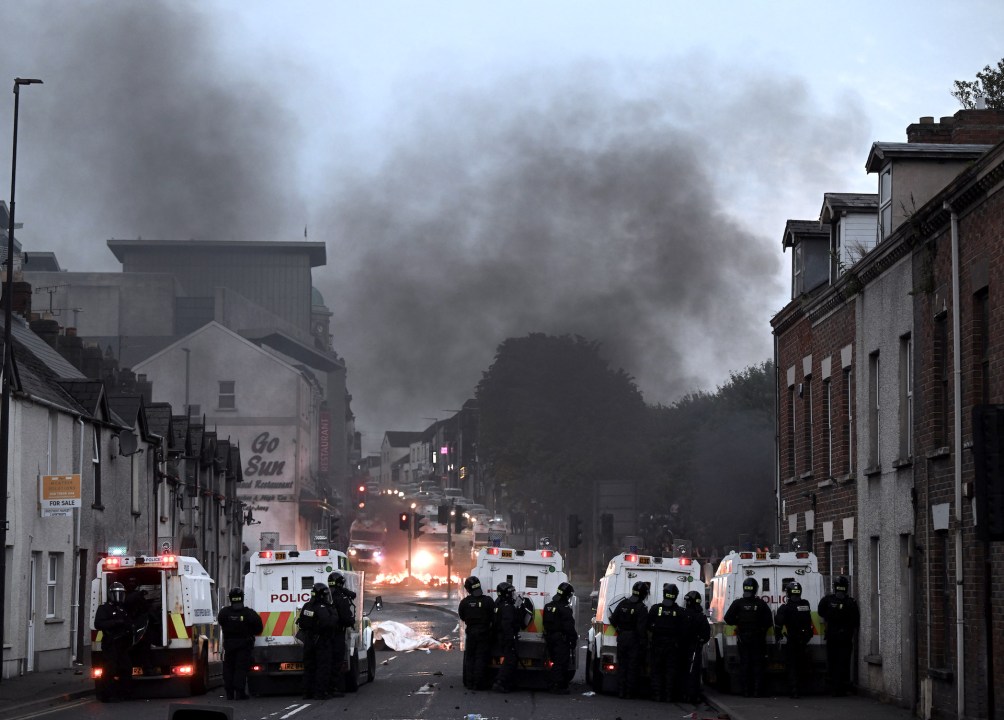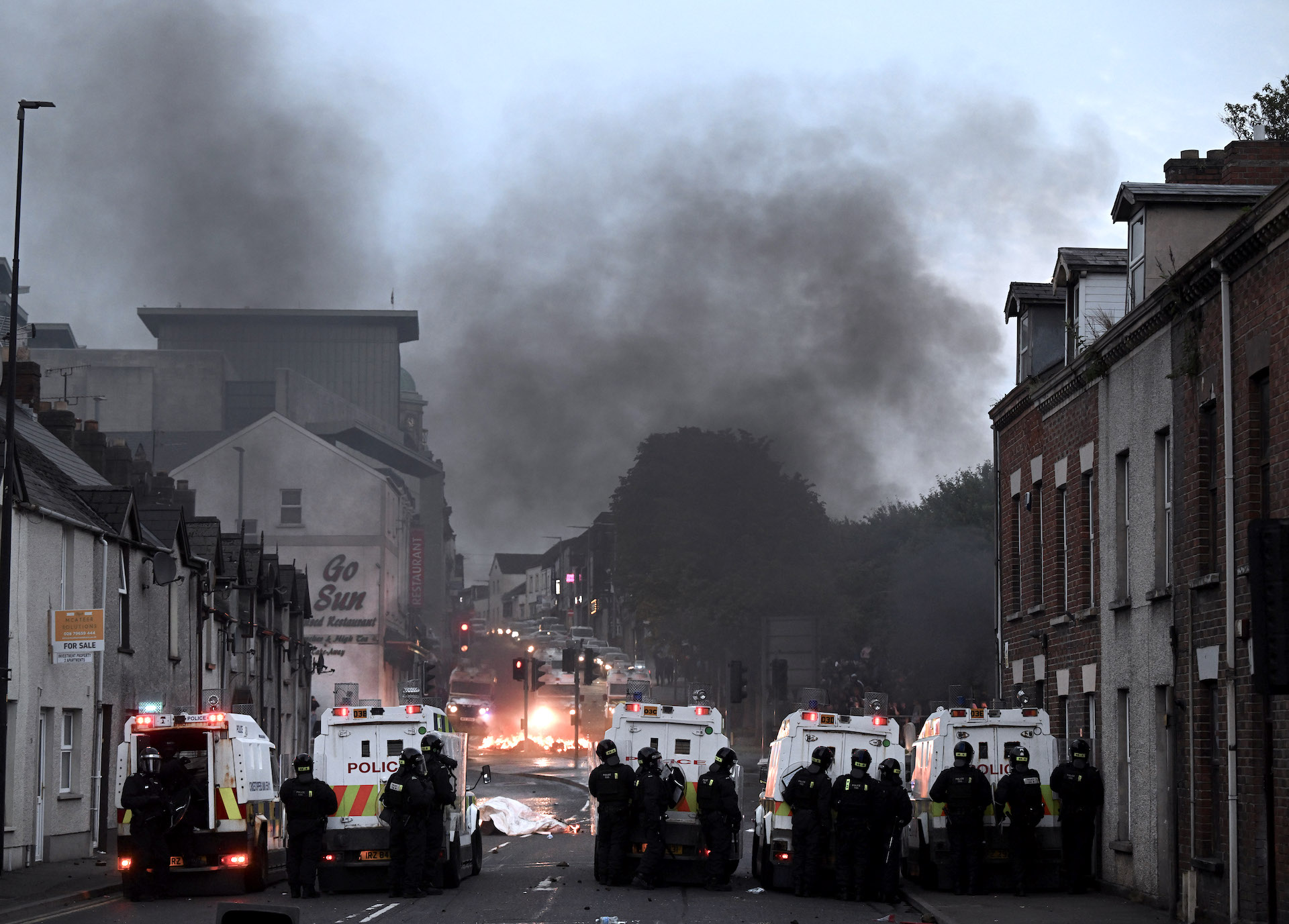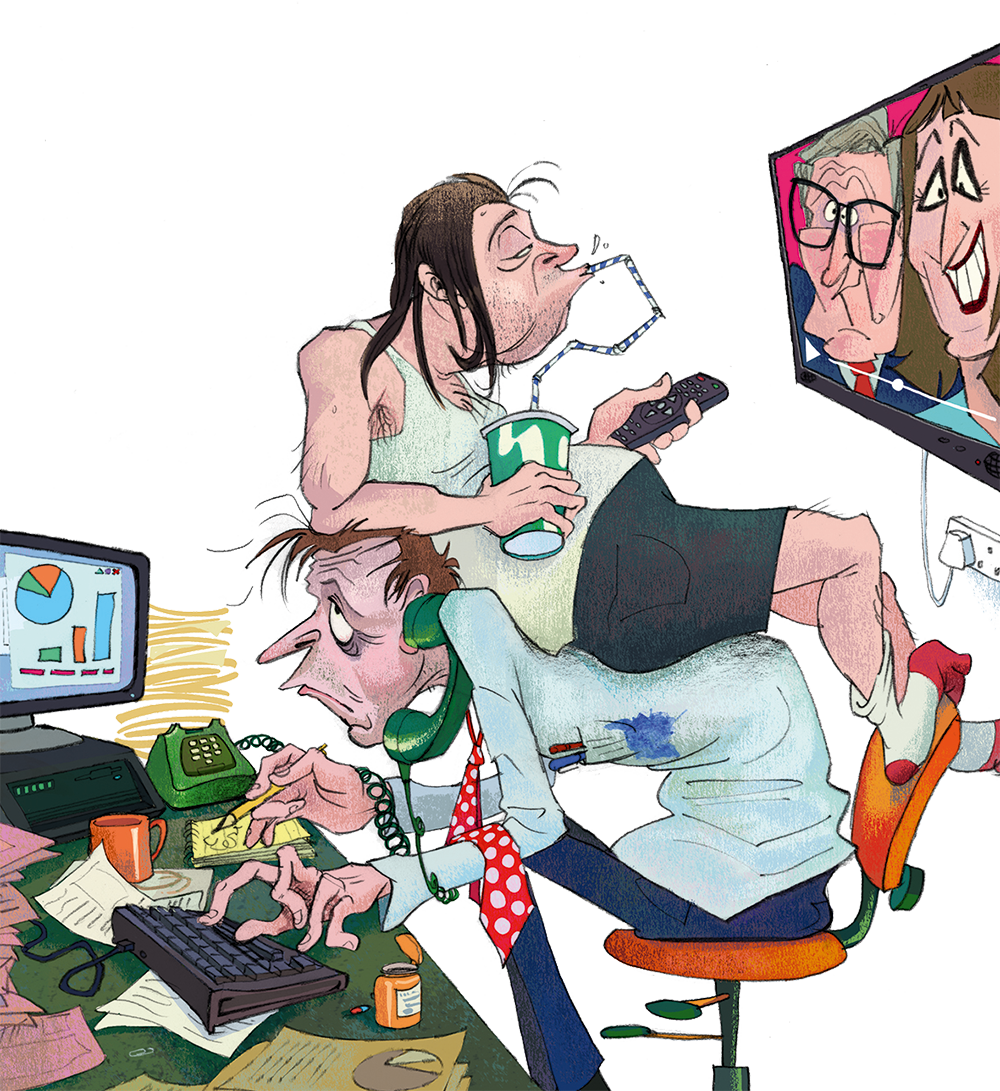Thursday evening. All quiet in Ballymena so far, after three nights of wrath. On the kerb of Waring Street – just off Larne Street, which rioters tore through on Tuesday and left burning and beaten – sit James and Casper, both 16. James is wearing a balaclava with a Rottweiler’s face printed on the front. Casper wears a hoodie. Opposite the boys, a woman is handing out signs for people to put in their windows which read ‘LOCALS LIVE HERE’, and down the road, on the corner of Henry Street and Railway Street, a man is pointing his phone at a row of parked police jeeps, and will expectantly livestream this scene to thousands of people on TikTok over the coming hours, as violence is predicted, feared and hoped for, but does not come to pass.
The rioting began on Monday 9 June. That morning, two 14-year-old boys appeared in court charged with the attempted rape of a teenage Ballymena girl. They spoke through a Romanian interpreter and word spread that they were Roma Gypsies. As a result, the Ballymenans decided that they wanted all the Roma out of their town immediately. That night, and for two nights after, they attacked Roma homes and the police who defended them. ‘It’s been mad,’ says Casper. ‘Petrol bombs going off everywhere. Explosions everywhere. It’s honestly hard to explain what’s going on anymore.’
Most of the violence occurred on seven roads where many Roma lived, and to go there now is to see the United Kingdom as a failed state. Houses are alternately burnt out and boarded up. Windows are fortified with stacks of furniture. ‘Roma rapists out’ is graffitied on walls. Residents of all nationalities make visual displays of their fealty to the UK with the aim of being spared a petrol bomb through their letterbox. From pretty terraced houses fly Union Jacks and other flags: the red hand of Ulster; the parachute regiment insignia; an NHS logo. These flags are not usually here. The patriotism is forced by terror. ‘There’s really nothing to be worried about if you’re local,’ says Casper.
Everyone in Ballymena says they saw the trouble coming a mile off. In a retail park across from a trashed up Bridge Street, I speak to Neil, a big guy, ex-army. ‘This,’ he says, ‘has been coming for years. This place is swamped with people. People of the Gypsy persuasion. Women couldn’t walk the street without feeling intimidated and scared. Three, four, five, six guys, they hang about in groups and gangs. You could see a parent walking down the street with a young girl, and you can see what they’re looking at, and it’s not the parent, it’s the little girls that they’re after. And it’s not right. People have had enough of them. They really have.’
Katie works for the NHS and has a teenage daughter. We talk, and on the road next to us the tarmac is scabbed and deformed from a fire started by the rioters on one of the recent nights. ‘Girls have to feel safe in this town again,’ she says. ‘But I don’t want anything to happen to my daughter or her Romanian friends. It’s just… There’s a certain sort of foreign national… They are very dangerous. It’s the way they’ve been brought up. You can understand why people are so cross. I knew this was going to happen.’
I walk through Ballymena with a Filipino man called Leonard who works in a care home. He has two boys, 15 and nine, and is worried that locals will turn on his family. ‘I didn’t want to go out because of my skin,’ he says. He is wearing a cap and sunglasses.
‘MOVE MOVE MOVE MOVE MOVE!’ On Friday night I am on West Street in Portadown, 40 miles south of Ballymena, where the wrath has come. Police with dogs are running at us, and we retreat fast. People gathered here at 7 p.m., and at around 10 p.m. a kid turned up with what can only be described as a firework machine gun. He shot it straight at the line of officers. That got things going. Police are trying to block access to a footbridge which connects the western to the eastern part of the town, where illegal immigrants are apparently living in HMOs.
Portadown burns, but in Ballymena many people are happy
We escape the dogs to a new position in an alleyway between West Street and Union Street. Me and some children. Adults are watching – many have brought drinks and a few are pushing prams with babies – but it’s little kids in balaclavas doing the rioting. In the cover of the alley an armoury emerges. The children rip up slabs of pavement and throw them at the ground to make smaller rocks. Twelve-year-olds prepare molotov cocktails and put them in their back pocket. The air stinks of petrol. The kids source more fireworks and share war stories about last night’s riot. One child says he was hit by a rubber bullet: ‘It’s like a fucking dildo hit me at 70 miles an hour!’ I wonder how much they care about immigration. And where are their parents? One kid charges at the police for some close-range action. He gets too near and the police grab him. ‘Was it Ruben?! Where’s Ruben??’ say his friends.
Away from the frontlines, boys and girls who have made themselves up for this evening of fun are flirting away. ‘Did you see the boy with the big firework yesterday?’ says a grinning teenage boy. Some high-ranking kid tells the dossers to focus: ‘We’re on the attack! Guys, come on! Move forward! Do something!’ A child unveils another firework machine gun, but accidentally holds it backwards and empties the rockets into the observing crowd.
Portadown burns, but in Ballymena many people are happy. I return to the town and cannot find Casper and James, which must be a good sign. There are still riot police around, and on Queen Street a woman is getting her living room window replaced, but the pubs are busy and jolly. At the Railway Tavern they play old loyalist songs on a karaoke machine:
Free, free, I just want to be
As free as the wind and the rain and the sea.
Free, free, I just want to be
Out where the rivers run free.
Together again,
We’ll fight as young men,
As our forefathers did in the great days of yore.








Comments